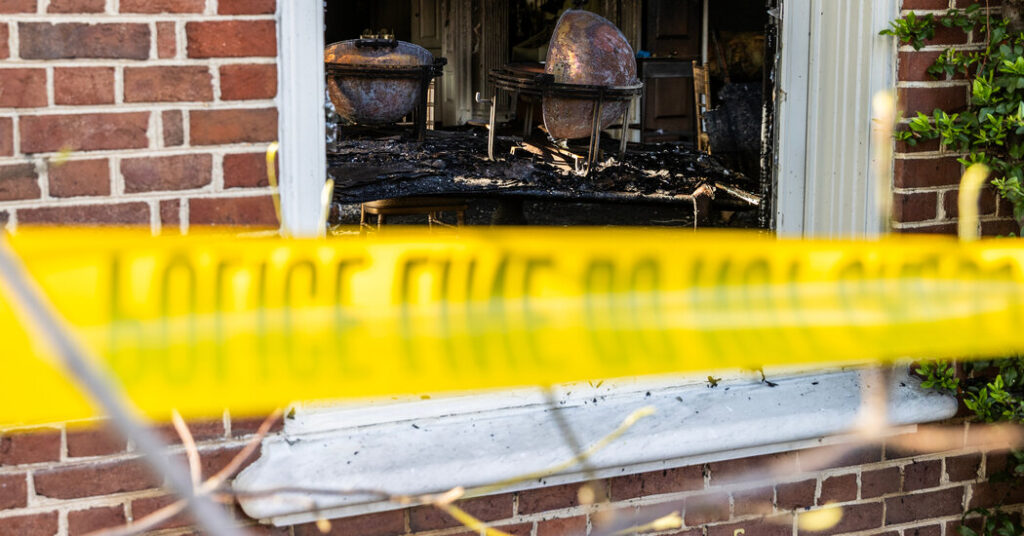A charred piano. A singed light fixture dangling by a cord in a fire-scarred room. Plates strewn with ash, not far from a dinner table just cleared from a Passover Seder.
The scorched rooms inside the official residence of Gov. Josh Shapiro of Pennsylvania were the work of an arsonist who the authorities say admitted “harboring hatred” for Mr. Shapiro. Officials say the suspect revealed that if he found the governor, he planned to beat him with a hammer.
The attack on Mr. Shapiro and his family was only the latest prominent attempt on the life of an American elected official. A string of violent outbursts in recent years has raised alarms about the threats lawmakers are confronting and the country’s often poisonous political environment.
President Trump faced two assassination attempts last year, a bullet grazing his ear at a rally in Pennsylvania. A group of extremists planned to kidnap Gov. Gretchen Whitmer of Michigan. A man broke into Representative Nancy Pelosi’s home and assaulted her husband with a hammer. A gunman attacked Republican members of Congress as they practiced for a baseball game, wounding Representative Steve Scalise of Louisiana.
Yet while the attacks on top officials have rattled Americans in both parties, research shows that political violence overall is not necessarily on the rise. Large-scale eruptions — with the notable exception of the Trump-inspired riot at the Capitol on Jan. 6, 2021 — have not become more frequent. Support among Americans for acts of political violence like murder or arson remains exceedingly low, according to a weekly study conducted by the Polarization Research Lab at Dartmouth College.
“The high-profile nature of the attacks definitely makes it so that the public perceives political violence as a threat to the country that is disproportionate to the actual nature of the problem,” said Sean J. Westwood, a professor at Dartmouth College and the director of the Polarization Research Lab.
But the relative rarity of political violence has done little to settle an American public increasingly on edge, and threats continue to flood the inboxes of elected officials, election workers and journalists.
Before the 2024 election, more than 70 percent of voters said they were “very worried” about political violence, according to a poll by the Leadership Conference on Civil and Human Rights.
On Sunday, Mr. Shapiro stood outside his residence, where broken and blackened windows sat behind yellow caution tape, and vowed to work harder as governor in the face of threats.
“This kind of violence is becoming far too common in our society, and I don’t give a damn if it’s coming from one particular side or the other, directed at one particular party or another, or one particular person or another,” Mr. Shapiro said, his voice rising with anger. “It is not OK, and it has to stop. We have to be better than this.”
Condemnation of the attack was swift and bipartisan.
“Thanks be to God that Governor Shapiro and his family were unharmed in this attack,” Vice President JD Vance wrote on social media. “Really disgusting violence, and I hope whoever did it is brought swiftly to justice.”
“Acts of violence have no place in our politics,” Senator Cory Booker, a Democrat from neighboring New Jersey, said in a statement. “Those responsible should be held accountable.”
Mr. Trump, who twice survived attempts on his life — and who has pointed to the specter of domestic terrorism as justification for his aggressive immigration agenda — did not issue a statement on Sunday or on Monday morning. Asked on Monday in the Oval Office about the attack, he said the assailant was “probably just a wack job.”
“Certainly a thing like that cannot be allowed to happen,” Mr. Trump said.
The authorities have yet to reveal more information on the suspect’s political leanings, but several Democrats and Jewish groups noted that the attack against Mr. Shapiro, who is Jewish, came on the first night of Passover. Law enforcement authorities have not commented on whether the arson is being investigated as a hate crime.
“Political violence of any kind is never acceptable, and it is especially unconscionable to attack a Jewish family during the first night of Passover,” Representative Hakeem Jeffries, the Democratic minority leader, said in a statement. “Everyone responsible must be prosecuted to the full extent of the law.”
Federal and state officials have taken steps to address threats of political violence. In 2021, Attorney General Merrick B. Garland created an elections threat task force based in the Justice Department’s public integrity unit. Last year, numerous election offices were fortified with bulletproof glass and an increased security presence.
Such steps have helped to ferret out and prevent attacks before they happen. Jena Griswold, the Democratic secretary of state in Colorado, received more than 1,800 death threats and violent threats last year. Law enforcement officials arrested and charged multiple people said to be responsible.
But the threats still prompted many local election officials and workers to resign or back away from working in the next election. In Colorado, county clerks had roughly 40 percent turnover, Ms. Griswold said in an interview, as “we have seen people step down because they are not willing to continue to work in this type of atmosphere.”
“It is very hard to live under that threat environment,” she said, adding how relieved she was that Mr. Shapiro and his family were safe. “It definitely takes a toll on just how you live your daily life, and it absolutely has affected elections here in Colorado and across the nation.”

